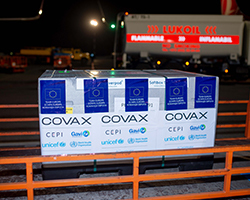Republic of Moldova first country in Europe to receive COVID-19 vaccine through COVAX Facility

WHO
The Republic of Moldova received 14 400 doses of COVID-19 AstraZeneca vaccine on 4 March 2021, shipped via the COVAX Facility, a partnership between the Coalition for Epidemic Preparedness Innovations (CEPI), Gavi, WHO and the United Nations Children’s Fund (UNICEF). The Republic of Moldova is the first country in the WHO European Region to receive vaccines as part of the COVAX Facility global procurement mechanism.
The arrival marked a historic step towards the goal of ensuring equitable distribution of COVID-19 vaccines globally, in what will be the largest vaccine procurement and supply operation in history. The delivery is part of a first wave of arrivals in the Republic of Moldova, which will continue in the coming weeks. All COVAX’s 190 participating economies will be able to access doses to protect vulnerable groups in the first half of 2021. At least 1.3 billion donor-funded doses will be made available to 92 economies eligible for the COVAX Advanced Market Commitment, including the Republic of Moldova, aiming for up to 20% population coverage by the end of the year.
“We are the first country in Europe to receive free vaccines through the COVAX platform and we are grateful for that. The 14 400 doses of COVID-19 vaccine will help us continue to immunize health workers and reduce the spread of the virus. We thank all the states and organizations that financially support this global platform – Germany and other European Union Member States, the United States, the United Kingdom of Great Britain and Northern Ireland, Canada, the European Commission, Japan and others – for their proved solidarity in these difficult times for all. We also thank WHO and UNICEF for their efforts to equitably distribute vaccines,” said Ms Maia Sandu, President of the Republic of Moldova during the handover ceremony at Chișinău International Airport.
The COVAX Facility is expected to deliver 24 570 doses of BioNTech/Pfizer COVID-19 vaccine and up to 264 000 doses of AstraZeneca COVID-19 vaccine to the Republic of Moldova in 2021.
“Vaccines will be a critical new tool in the battle against COVID-19 alongside ongoing public health measures to prevent transmission, including adhering to testing and quarantine measures, mask wearing, hand hygiene and physical distancing,” stressed Dr Igor Pokanevych, WHO Representative in the Republic of Moldova.
“Equitable and fair access to vaccines is a key element in ending the pandemic. The European Union [EU] and its Member States, acting together as ‘Team Europe’ are proud to support COVAX in delivering vaccines to our partners, and today we see the first vaccines via the COVAX platform arriving in the country. The EU has been and will continue to be a reliable partner in this process,” said Peter Michalko, Ambassador of the European Union to the Republic of Moldova.
“Through USAID [United States Agency for International Development], the United States supports the COVAX Facility in purchasing and delivering safe and effective vaccines for Moldova’s most vulnerable and at-risk populations, including frontline health-care workers. These vaccines are critical to controlling the COVID-19 pandemic and delivering hope that better, happier days are within sight,” said Dereck J. Hogan, United States Ambassador to the Republic of Moldova.
UNICEF is leveraging its experience as the largest single vaccine buyer in the world and working with manufacturers and partners on the procurement of COVID-19 vaccine doses, as well as freight, logistics and storage. “Vaccines are among the greatest advances of modern medicine. Sustainable supply of the vaccines is the only way out of this crisis and we must ensure that vaccination is available for all,” said Maha Damaj, UNICEF Moldova Country Representative.
Over 180 000 Moldovans have been infected with the virus that causes COVID-19 and over 4000 lives have been lost. Romania shipped the first donation of AstraZeneca’s COVID-19 vaccine to the Republic of Moldova on 27 February 2021, allowing the country to start vaccinating frontline health workers on 2 March 2021.



